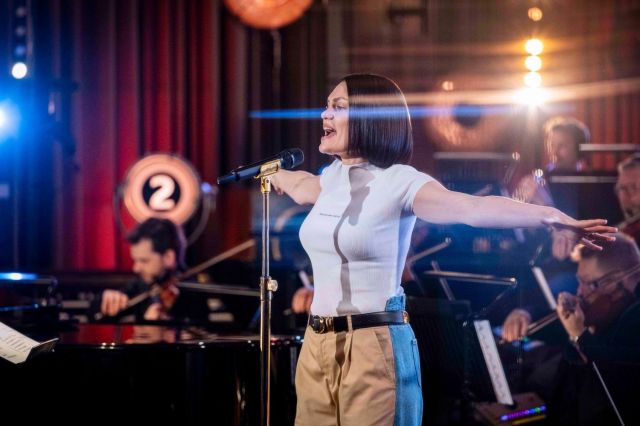20 Questions With…Emma Fielding
Emma Fielding, currently starring in Private Lives, explains how she keeps Sibyl saucy in Coward’s classic comedy & why she’d love to swap places with her mum.
In the eight years since actress Emma Fielding moved to London, she’s made a big impression on the capital’s theatrical scene. Her first big role in Tom Stoppard’s Arcadia, alongside Felicity Kendal and Rufus Sewell at the National Theatre, landed her the Critics Circle Award for Most Promising Newcomer.
Later that same year, she won an Ian Charleson Award for The School for Wives (Almeida). And other major roles followed – including Heartbreak House (Almeida), The School for Scandal (an RSC production for which she received an Olivier nomination) and Spinning into Butter (Royal Court).
Fielding has also established a successful career in television, appearing in such dramas as Tell Tale Hearts, A Dance to the Music of Time and Other People’s Children. Her recent screen work includes the BBC’s Green-Eyed Monster, and her forthcoming film projects number Pandaemonium and Discovery of Heaven.
Fielding’s current role in Noel Coward’s classic comedy, Private Lives, marks her first in the heart of the West End. Directed by Howard Davies, the production also stars Alan Rickman, Lindsay Duncan and Adam Godley.
Date & place of birth
Born to an army family in Catterick, North Yorkshire. Never ask an actress her age if you want to get the truth.
Trained at
The Royal Scottish Academy of Music and Drama
First big break
Arcadia at the Royal National Theatre
Career highlights to date
Arcadia, obtaining work at the Royal Shakespeare Company and A Respectable Trade, a BBC drama about the slave trade. And, of course, working now in the West End for the first time.
Favourite production you’ve ever worked on & why?
Arcadia will always have a special place in my memory. It was an extraordinary play and I had an extraordinary part in it. I think many people could wait their whole careers to have such an opportunity as that.
Favourite co-star
They’ve all been great. Sorry!
Favourite director
I’m not saying this just to ensure future employment, but I have learnt a great deal from each director I’ve worked with, and with each new play and part. I have been lucky to work in some really varied genres. However, both Trevor Nunn and Declan Donnellan both seem to be gifted with telepathy – they know what you’re thinking before you do and encourage you to be really brave.
Favourite playwright
Well, it has to be Shakespeare. His plays take endless exploration and questioning and are full of a really humane understanding of the human condition.
What role would you most like to play still?
I would love to do Shakespeare’s Beatrice (from Much Ado About Nothing), Imogen (Cymbeline) or Cleopatra (Antony & Cleopatra) one day. Also, any of those glorious Russian women in Chekhov, Turgenev and Gorky. And Hedda Gabler.
In your opinion, what’s the best thing currently on stage?
Redundant at the Royal Court, which has a great central performance. Also, Humble Boy and Luther at the National.
What advice would you give to the government to secure the future of British theatre?
Not to see it as a luxury, but as a central part of life. Accessibility and perception are also part of the problem, so reduce ticket prices somehow. Furthermore, don’t reduce funding in real terms and invest in education and creating more outreach programmes.
If you could swap places with one person (living or dead) who would it?
My mum, so that I could sit down more often.
Favourite book
The Complete Works of Shakespeare.
Favourite joke
Two aerials got married. The wedding was rubbish but the reception was fantastic.
What do you dislike about the Internet?
I hate being cut off mid-surf.
Why in particular did you want to accept your part in Private Lives?
I’ve never done Noel Coward‘s work before, and to be honest the thought rather terrified me as it can be very exacting. I also wanted to see if I could make the character Sibyl work in a modern environment without it being a purely comic creation.
Coward remains extremely popular with audiences. Do you think this is English nostalgia or is there something deeper behind the work?
It’s not just nostalgia. Private Lives is a beautifully constructed and musically rhythmic play and as a performer you fight it at your peril. In terms of its portrayal of love, marriage and relationships, it hits on fundamental truths which have not changed and possibly never will. Beneath the glamour and style, there is a dark cruelty and honesty and it’s still very funny.
Private Lives was considered risqué in its time, owing to its unfaithful characters. What can a modern interpretation offer to maintain that general sense of indecency?
Of course that notion of indecency no longer exists in a modern moral context, but betrayal and deception are unchanging facets. The fallout from two people unable to control the urge to abandon their respective spouses is, again, something unchanging, upsetting and timeless.
What’s your favourite line from Private Lives?
There are so many to choose from. Of Sibyl’s it’s a toss-up between “Mother was perfectly right, she said you had shifty eyes,” and “It’s all perfectly horrible, I feel smirched and unclean as though slimy things had been crawling all over me.”
What was the funniest moment during rehearsals for Private Lives?
Sorry, I can’t really think of anything – which isn’t to say it hasn’t been really enjoyable. The play is humorous enough in itself, even though of course comedy is a serious business!
– Emma Fielding was speaking to Gareth Thompson
Private Lives – also starring Alan Rickman, Lindsay Duncan and Adam Godley – opened on 4 October 2001 (following previews from 21 September). It is currently booking to 8 January 2002.












